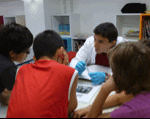A dialogue bet ween young researchers and the general public – the Experimentarium in Lorraine
ween young researchers and the general public – the Experimentarium in Lorraine
PI: Pascale Frey-Klett and Annick Brun (UMR 1136 INRA / Université de Lorraine « Interactions Arbres/Micro-organismes »
Collaborations : Michelle Cussenot, vice-president of La Vigie de l’eau
_____________________________
Context and Objectives — The Experimentarium aims to bring together science and society by giving the public the opportunity to meet young researchers and by creating a moment of rich discovery. Meetings will be organized around open forum question-answer sessions to permit the public to understand that science is most importantly a human activity made up of an exciting mix of imagination, observations, assumptions, challenges and discoveries. With the endorsement of the entire group of doctoral schools associated with the University of Lorraine, the Experimentarium is an accredited qualification module for PhD students, active since 2008 in the Lorraine region. This program, first created at the University of Burgundy, is run in Lorraine by the association La Vigie de l’eau in close collaboration with INRA (http://www.lavigiedeleau.eu/node/62).
Approach — Accompanied by the Experimentarium teaching staff, young researchers are encouraged to use their own research to develop original and interactive workshops by using experiments and every day objects to present to non-specialist audiences the essentials of their research.
The originality of Experimentarium in Lorraine is that workshops are held in rural areas far removed from the world of research.
Expected results and impacts — Our aim is to present the experience of working in science and research to the widest public audience possible. The PhD students who participate in Experimentarium likewise are given the opportunity to improve their communication skills with non-specialists. By engaging in open dialogue with the public, they learn to talk about their research activity and to share their passion for science. They are given the chance to consider their personal contribution to the scientific approach and to examine the larger implications of work they conduct on a daily basis.


